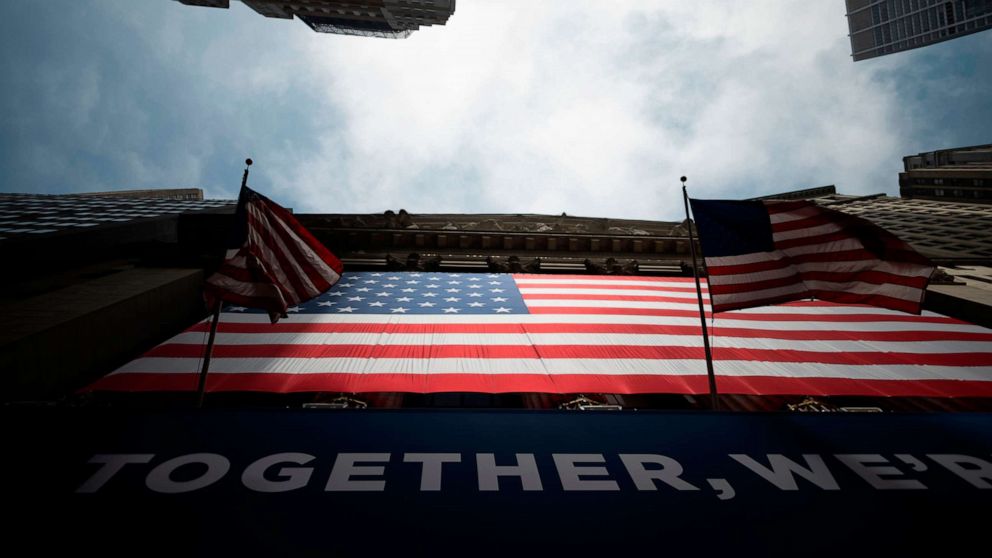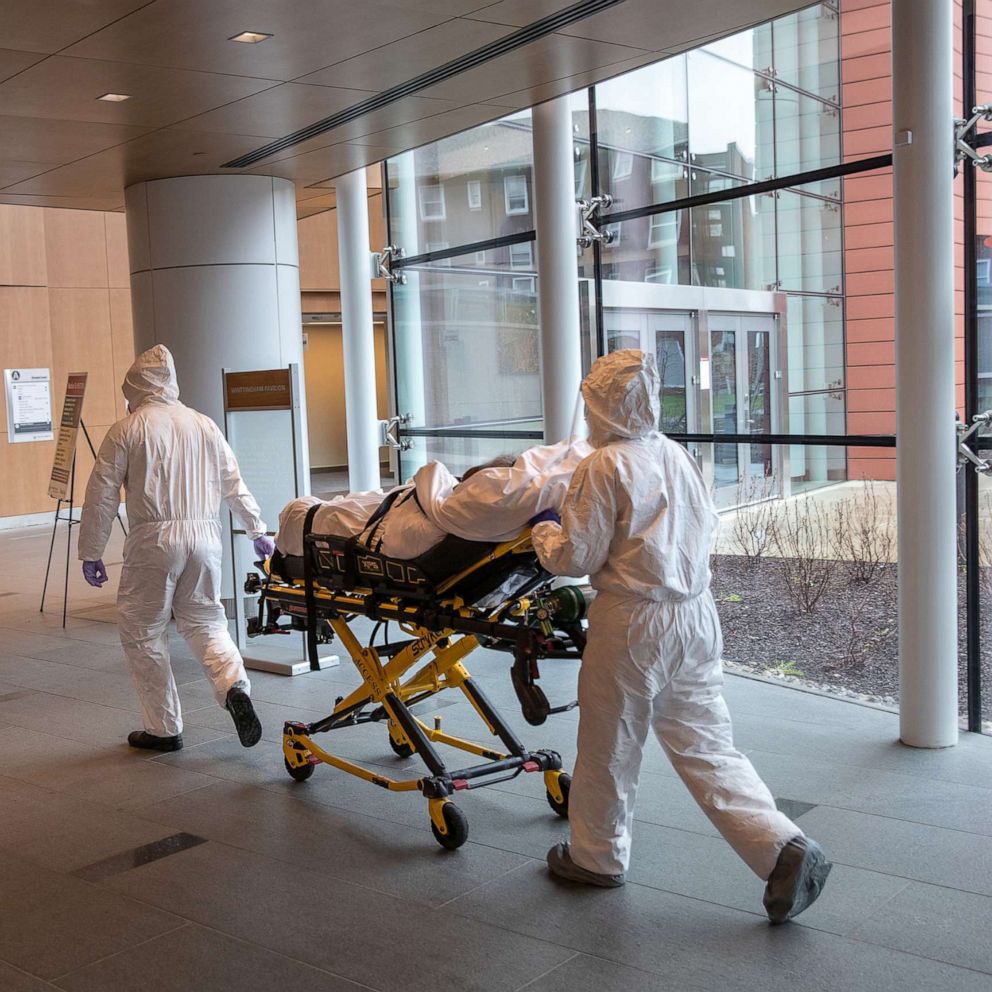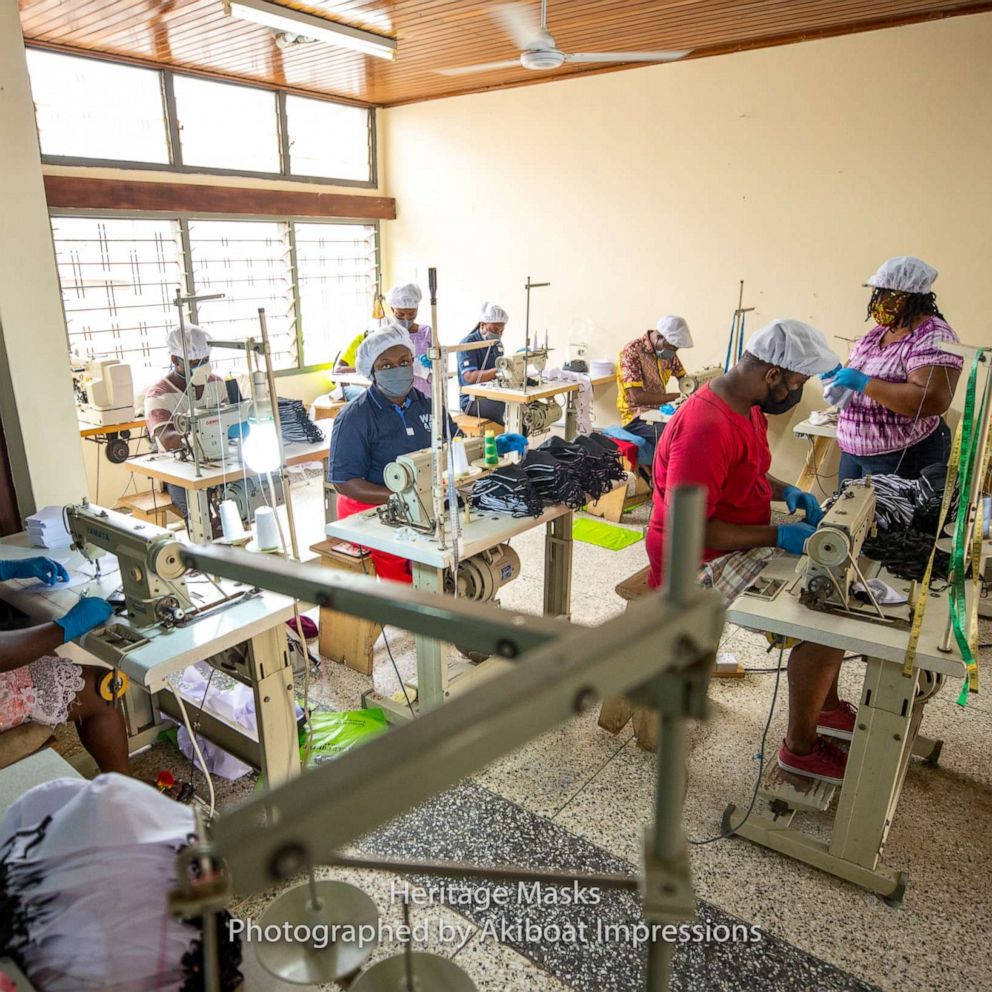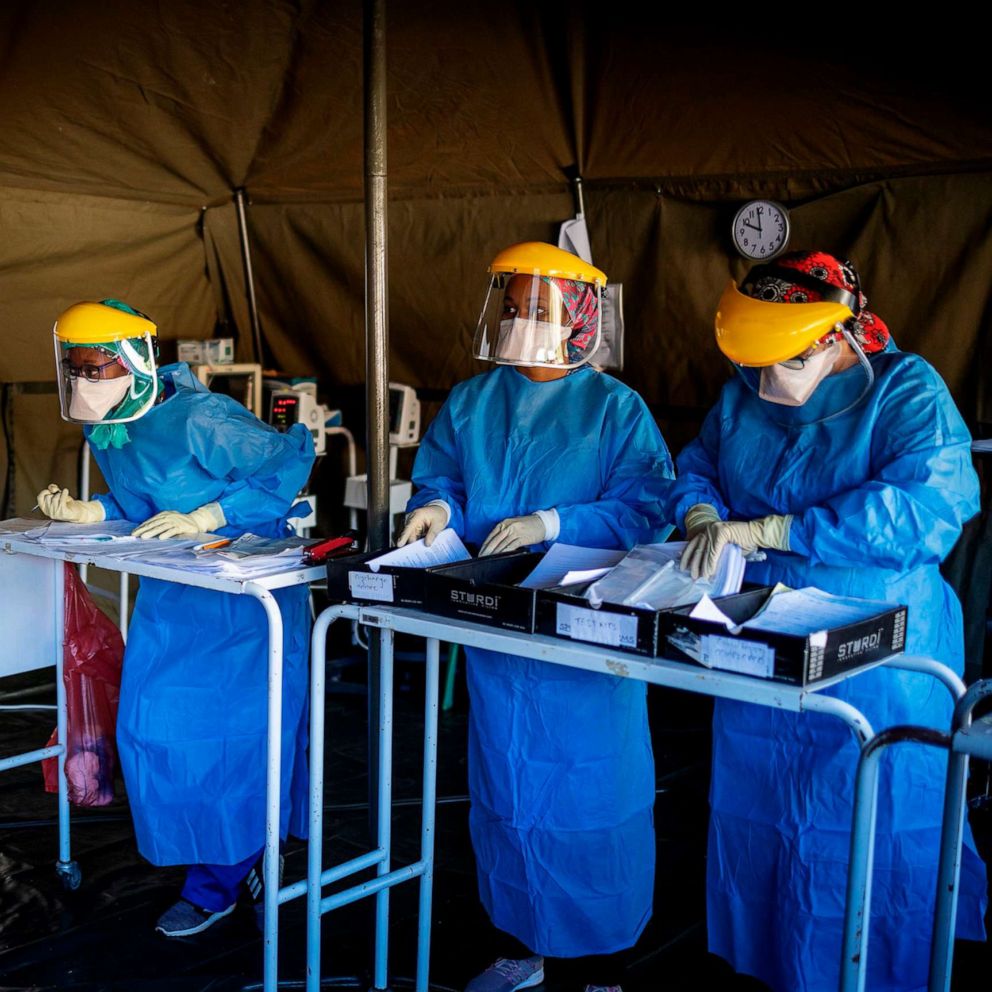Over 100,000 new coronavirus cases for 5 days straight, WHO says
A pandemic of the novel coronavirus has now killed more than 383,000 people worldwide.
Over 6.39 million people across the globe have been diagnosed with COVID-19, the disease caused by the new respiratory virus, according to data compiled by the Center for Systems Science and Engineering at Johns Hopkins University. The actual numbers are believed to be much higher due to testing shortages, many unreported cases and suspicions that some governments are hiding the scope of their nations' outbreaks.
Since the first cases were detected in China in December, the United States has become the worst-affected country, with more than 1.8 million diagnosed cases and at least 107,099 deaths.
Today's biggest developments:
Here's how the news is developing today. All times Eastern. Please refresh this page for updates
8:23 p.m.: Extension passes for PPP loans
The Senate worked out its differences quickly -- and unanimously -- as it passed the House's Paycheck Protection Program bill, giving desperate borrowers more time to spend the funds and more flexibility in how those funds are spent.
Instead of having to spend 75% of the loan in eight weeks, small business owners will have 24 weeks with 60% spent on worker pay.
The bill now goes to President Donald Trump for his signature.
This was crucial, particularly for those small business owners who got in on the first loans in early April. Their deadline to apply to their lender for forgiveness was coming up at week's end.
6:50 p.m.: 400,000 Americans may die from coronavirus by next spring, expert warns
Up to 400,000 Americans may be dead from COVID-19 by next spring, before a potential vaccine is ready for mass distribution, a leading public health expert warned Wednesday.
"All of the best models suggest that another 100,000 will die over the next three to four months if we continue to have 1,000 deaths a day," Dr. Ashish Jha, director of the Harvard Global Health Institute, said during a forum on the government's coronavirus response. "It is entirely possible that by next spring, by the time we might get a vaccine, 300,000 to 400,000 Americans will have died from this disease."
Jha said the deaths are "wholly preventable." But it will take "smart policy and accountability from the federal government."
"As the nation opens up, and as we face turmoil with people in the streets, the bottom line is that we are not performing enough tests to keep people safe," Jha said, adding that some estimates suggest that 80% of COVID-19 cases are being missed.
The U.S. death toll currently stands at 107,000.
5:50 p.m.: Maryland can reopen nail salons, retail, offices Friday
Maryland will enter the next stage of its phased reopening on Friday at 5 p.m., allowing for more nonessential businesses and offices to reopen, Gov. Larry Hogan announced Wednesday.
The businesses included are manufacturing, construction, retail, offices and car dealerships. Nail salons, massage therapists, tanning salons and tattoo parlors can also reopen at 50% capacity.
Safety guidelines include wearing masks, conducting health screenings and teleworking if possible.
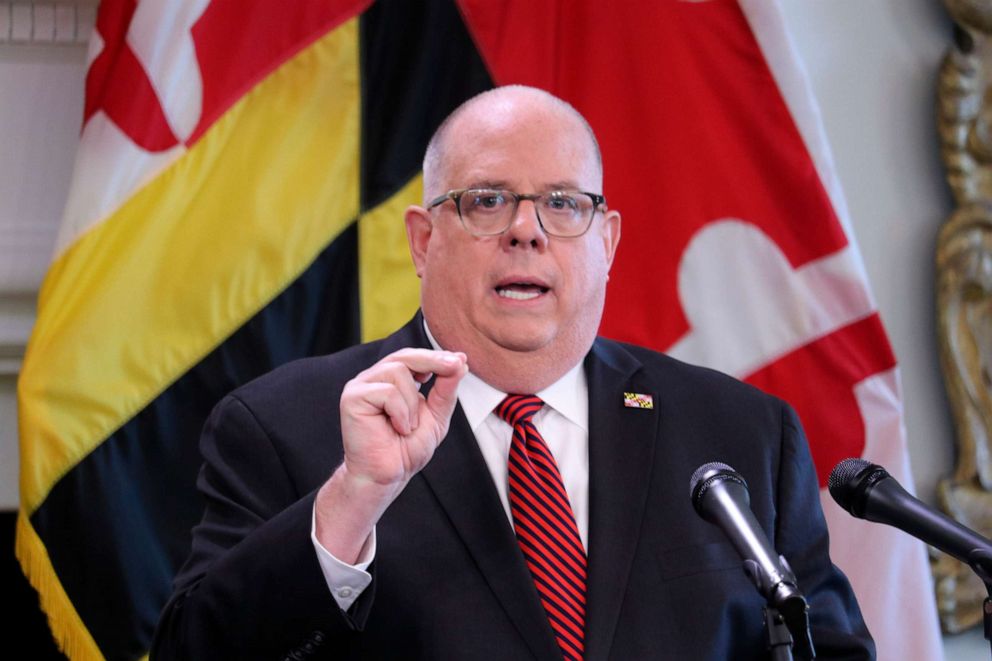
Previously, barbershops, hair salons, outdoor dining, outdoor youth sports and day camps, outdoor pools and drive-in movie theaters were able to reopen.
Other outdoor amusements and gyms remain closed.
Maryland's total COVID-19 hospitalizations are at the lowest point in 50 days, Hogan said. There are 54,982 confirmed cases, up 807 from the day before, and 2,519 deaths, according to the state health department.
4:40 p.m.: Anti-malaria drug touted by President Trump did not prevent COVID-19 infections, study finds
The first carefully controlled trial of hydroxychloroquine -- the anti-malaria drug President Donald Trump took as a prophylactic against COVID-19 -- did not show any benefit in preventing the virus, a new study found.
Researchers at the University of Minnesota and McGill University, along with other universities, studied 821 patients in the U.S. and Canada who had been exposed to COVID-19. After the participants took HCQ or a placebo within four days of exposure, researchers noted if they developed COVID-19 themselves. Due to diagnostic testing shortages in the U.S., patients were observed for self-reported symptoms, rather than confirmed tests, the study noted.
In analyzing the prevention of COVID-19 using HCQ, the researchers found no benefit in the drug, the study found. It's important to note that this study only tested HCQ alone and not a combination of HCQ with zinc and vitamin D, which the president promoted and took himself.
In a memo on Trump's latest physical results, the president's physician, Dr. Sean Conley, said Wednesday that the president had experienced no side effects from taking HCQ. His heart was tested with an EKG, since a possible side effect of HCQ usage is an irregular heartbeat. The memo noted the president took a two-week course of the drug, along with zinc and vitamin D, in May following the diagnosis of COVID-19 in two West Wing staffers.
2:50 p.m.: 100,000-plus COVID-19 cases reported for each of the past five days: WHO
There have been more than 100,000 COVID-19 cases reported for each of the past five days, the World Health Organization said Wednesday.
The Americas continue to account for the most cases, WHO Director-General Dr. Tedros Adhanom Ghebreyesus said at a daily COVID-19 press briefing in Geneva.
Central and South America are experiencing "accelerating" COVID-19 epidemics, the WHO said, particularly in Haiti. There is also intense community transmission in Brazil, Peru and Nicaragua.
Brazil has the second-highest number of confirmed cases in the world, with more than 555,000, according to a tally from Johns Hopkins University.
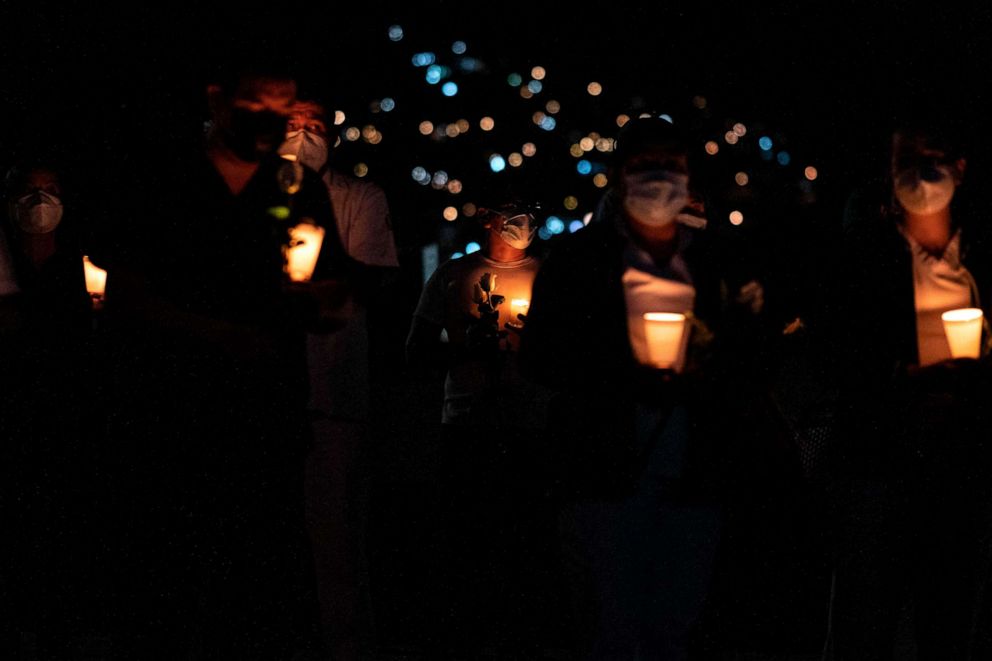
Meanwhile, the number of cases in Europe continues to decline, the WHO reported.
"Yesterday saw the fewest cases reported in Europe since the 22nd of March," Tedros said.
12:30 p.m.: New York state sees lowest daily hospitalizations
The number of new COVID-19 hospitalizations in New York state is at its lowest level yet, Gov. Andrew Cuomo said Wednesday, while reminding residents to "stay smart."
New hospitalizations tallied 135 -- down from a mid-April peak of 3,181. There were 49 new deaths -- 37 in hospitals, 12 in nursing homes.
But the governor warned that the virus is still a threat, especially as thousands protest the death of George Floyd in the streets.
"If you're going to protest, protest intelligently," Cuomo said. "Remember the COVID virus is still out there."
10:30 a.m.: Over 600 nurses worldwide have died from COVID-19, group says
More than 230,000 health workers around the world have contracted the novel coronavirus since the start of the global pandemic, while over 600 nurses have died from it, according to a new analysis by the International Council of Nurses.
The figures show that an average of 7% of all COVID-19 cases worldwide are among health care workers.
The International Council of Nurses, which represents more than 130 national nursing associations with 20 million members worldwide, said the analysis is based on data from its associations, official figures and media reports from a limited number of countries," since "there is no systemic and standardized record" of the global number of nurses and health care workers who have tested positive for COVID-19 or succumbed to the disease.
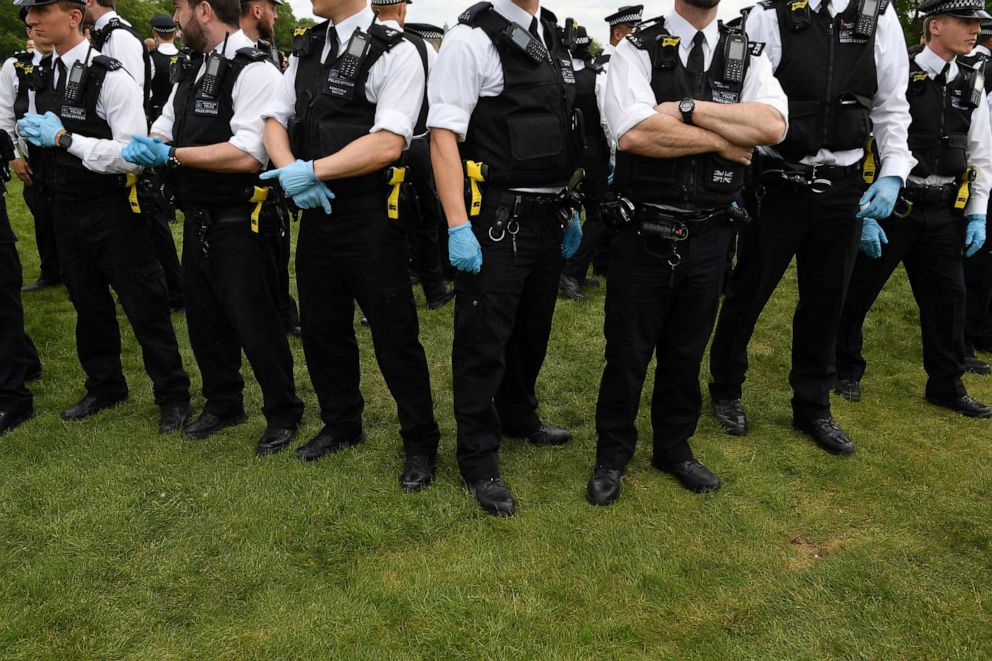
The group is calling on governments to record the number of COVID-19 infections and deaths among health care staff as well as take whatever measures are needed to protect them.
'Without this data we do not know the true cost of COVID-19, and that will make us less able to tackle other pandemics in the future," ICN CEO Howard Catton said in a statement Wednesday.
8:49 a.m.: Data shows black people in London more likely to be fined or arrested over lockdown breaches
Black people in London were more likely than their white counterparts to be fined or arrested for breaching coronavirus lockdown rules, according to police statistics released Wednesday.
While enforcing the new restrictions imposed to curb the spread of the novel coronavirus, London's Metropolitan Police Service issued 973 fines between March 27 and May 14. The figures show that white people, who make up 59% of the U.K. capital's population, received 444 fines, or 45.6%. Black people, who make up 12% of the population, received 253 fines, or 26%. Asian people, who make up 18% of the population, received 220 fines, or 22.6%, according to the report.
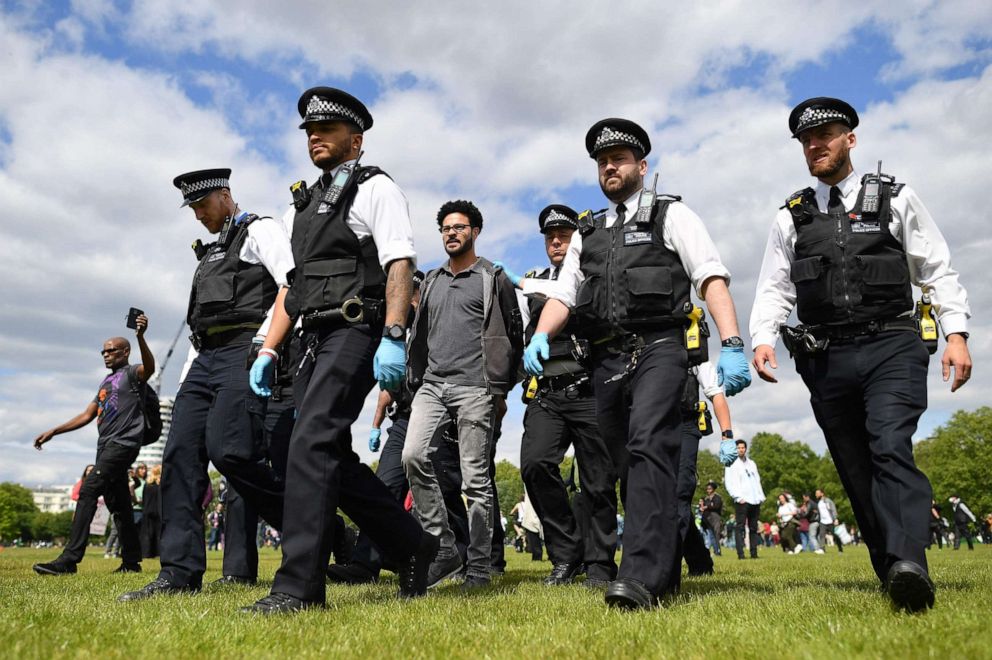
During the same time period, police only arrested 36 people for breaking coronavirus restrictions where no other criminality was a factor. However, police made 711 additional arrests where other criminality was the primary reason and, as a result of that criminality, the individuals were also in breach of the lockdown rules. The figures show that white people accounted for 38% of those arrests while black people accounted for 31%.
In total, more white people were fined or arrested than other individual ethnic groups. However, when compared with the composition of the resident population, higher proportions of black and minority ethnic groups were issued fines or arrested across London as a whole.
"The reasons for this are likely to be complex and reflect a range of factors," the Metropolitan Police Service said in a statement Wednesday, alongside the release of the report. "This includes interactions between the areas subject to significant proactive policing activity targeting crime hot-spots and both the variation in the age-profile and geographical distribution of ethnic groups in London."
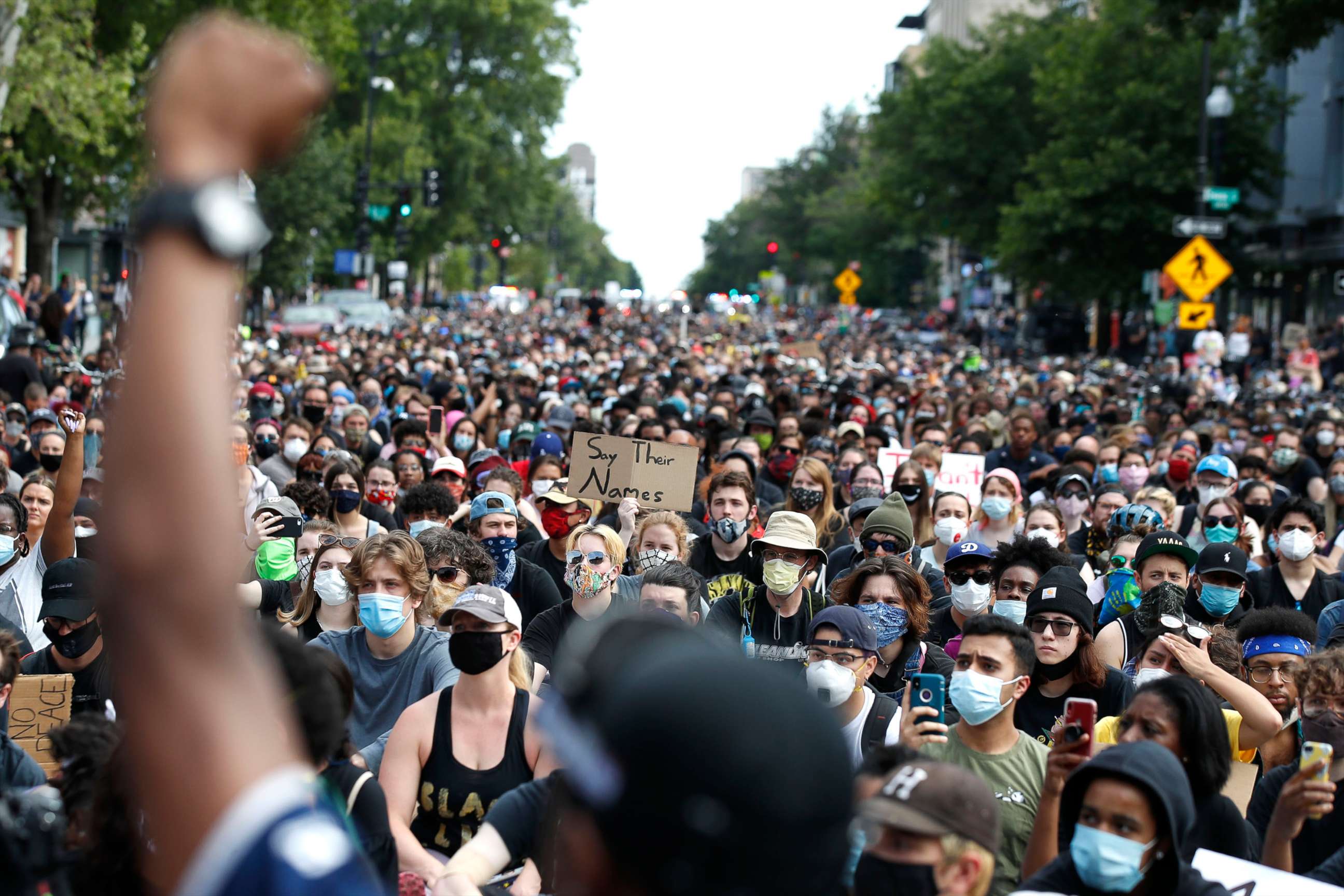
The police force, which is Britain's largest, noted its officers "have reported that in most interactions once they have explained that an individual or group were in breach they have followed police advice without the need for the use of our enforcement powers."
"Our aim has been to protect London, and not to unnecessarily criminalize where we can avoid it," Metropolitan Police Assistant Commissioner Mark Simmons said in a statement Wednesday. "We have seen, overall, good compliance when we have intervened, meaning in most cases the need for issuing a Fixed Penalty Notice or arrest has been unnecessary. I hope Londoners will be reassured as a result of the low volume of COVID-19 related enforcement that we have been using the new powers only when we have absolutely needed to."
Tune into ABC at 1 p.m. ET and ABC News Live at 4 p.m. ET every weekday for special coverage of the novel coronavirus with the full ABC News team, including the latest news, context and analysis.
7:22 a.m.: Oklahoma State linebacker tests positive after attending protest
Oklahoma State University linebacker Amen Ogbongbemiga said he has tested positive for COVID-19 after attending a protest in Tulsa.
"After attending a protest in Tulsa AND being well protective of myself, I have tested positive for COVID-19," Ogbongbemiga, who will be a senior this fall, wrote on Twitter Tuesday night. "Please, if you are going to protest, take care of yourself and stay safe."
Mass protests have taken place in every U.S. state following the death of George Floyd, an unarmed black man who died on May 25 in Minneapolis shortly after a white police officer was filmed kneeling on his neck for nearly nine minutes as three other officers stood by.
The Minneapolis Police Department has since fired all four officers, and the one seen pinning Floyd down, Derek Chauvin, has been charged with third-degree murder and manslaughter. However, protesters are calling for the three other officers to be charged and are decrying the overall treatment of black Americans by police.
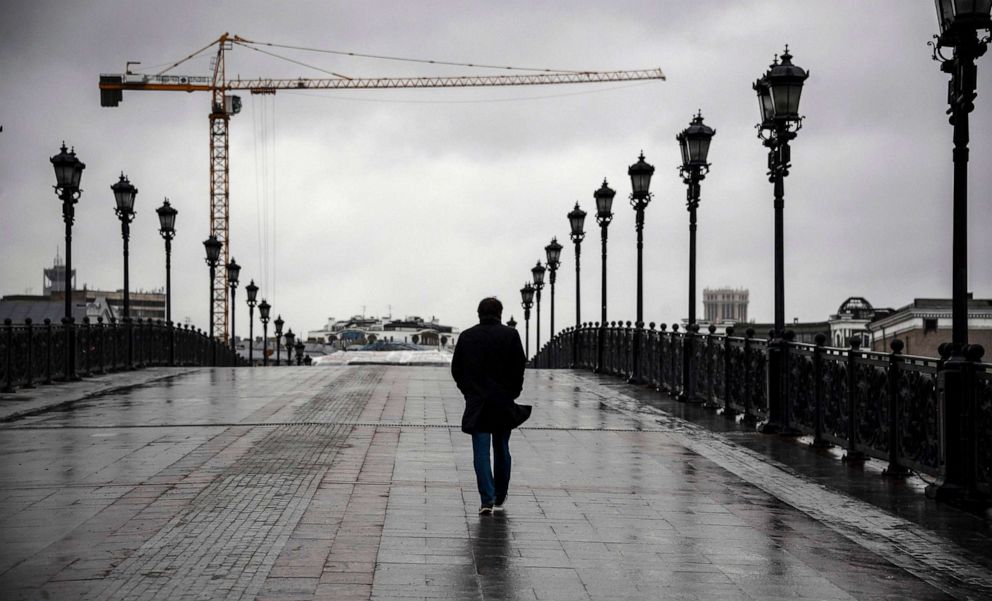
The number of people who have taken to the streets in the days since Floyd's death has been in the hundreds of thousands. Although many protesters have worn face masks and some have distributed hand sanitizer, they have been gathering in close proximity, forgoing social distancing guidelines that help prevent the spread of the novel coronavirus.
In an interview published Monday on Politico, U.S. Surgeon General Dr. Jerome Adams warned of new clusters of cases of the highly contagious disease as a result of the nationwide protests.
"Based on the way the disease spreads," Adams said, "there is every reason to expect that we will see new clusters and potentially new outbreaks moving forward."
6:16 a.m.: Russia reports under 9,000 new cases
Russia's coronavirus headquarters said Wednesday it had registered 8,536 new cases of COVID-19 and 178 deaths in the past 24 hours.
The country's tally now stands at 432,277 diagnosed cases with 5,215 deaths. Moscow, the capital, is the hardest-hit city in the country, accounting for about half of all infections.
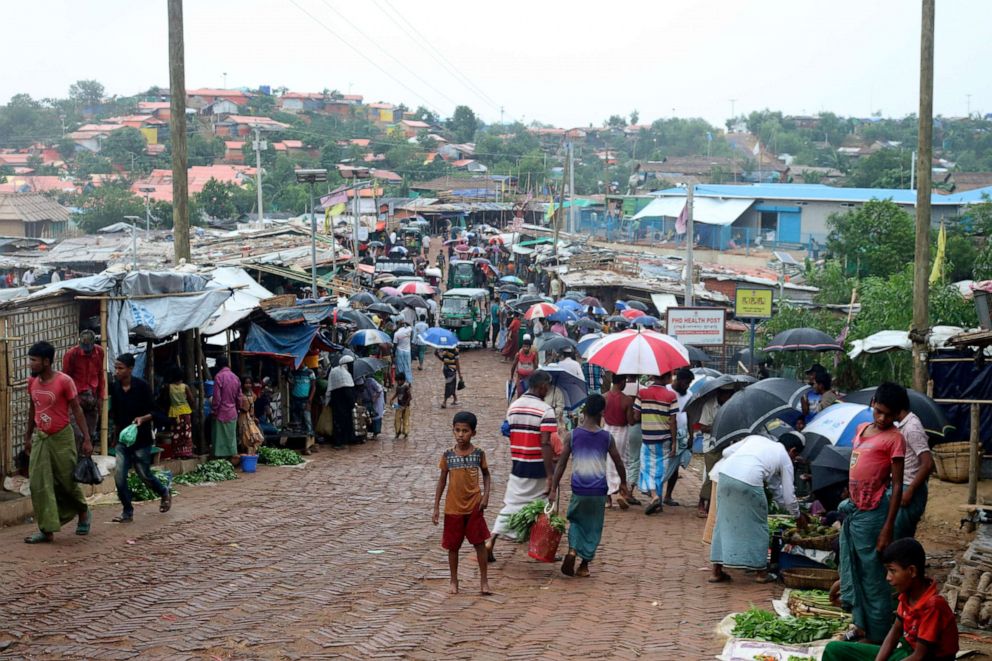
The latest daily caseload is down from a peak of 11,656 new infections reported on May 11, during which Russia registered over 10,000 new cases per day over a 12-day period. Since then, the daily number of new infections has hovered around 9,000.
Russia has third-highest number of cases in the world, behind Brazil and the United States, according to a count kept by Johns Hopkins University.
What to know about coronavirus:
- How it started and how to protect yourself: Coronavirus explained
- What to do if you have symptoms: Coronavirus symptoms
- Tracking the spread in the U.S. and worldwide: Coronavirus map
5:23 a.m.: UN reports 1st coronavirus death of Rohingya refugee
A Rohingya refugee who contracted the novel coronavirus in the world's largest refugee camp has died, according to the United Nations High Commissioner for Refugees.
It's the first known coronavirus-related death of a Rohingya refugee.
The UNHCR said the refugee, who was not named, tested positive for COVID-19 in one of the densely-packed camps near Cox's Bazar, Bangladesh. The sprawling camps and surrounding makeshift settlements are home to nearly 1 million Rohingya refugees who fled ethnic violence and persecution in neighboring Myanmar, where they are a stateless Muslim minority group.
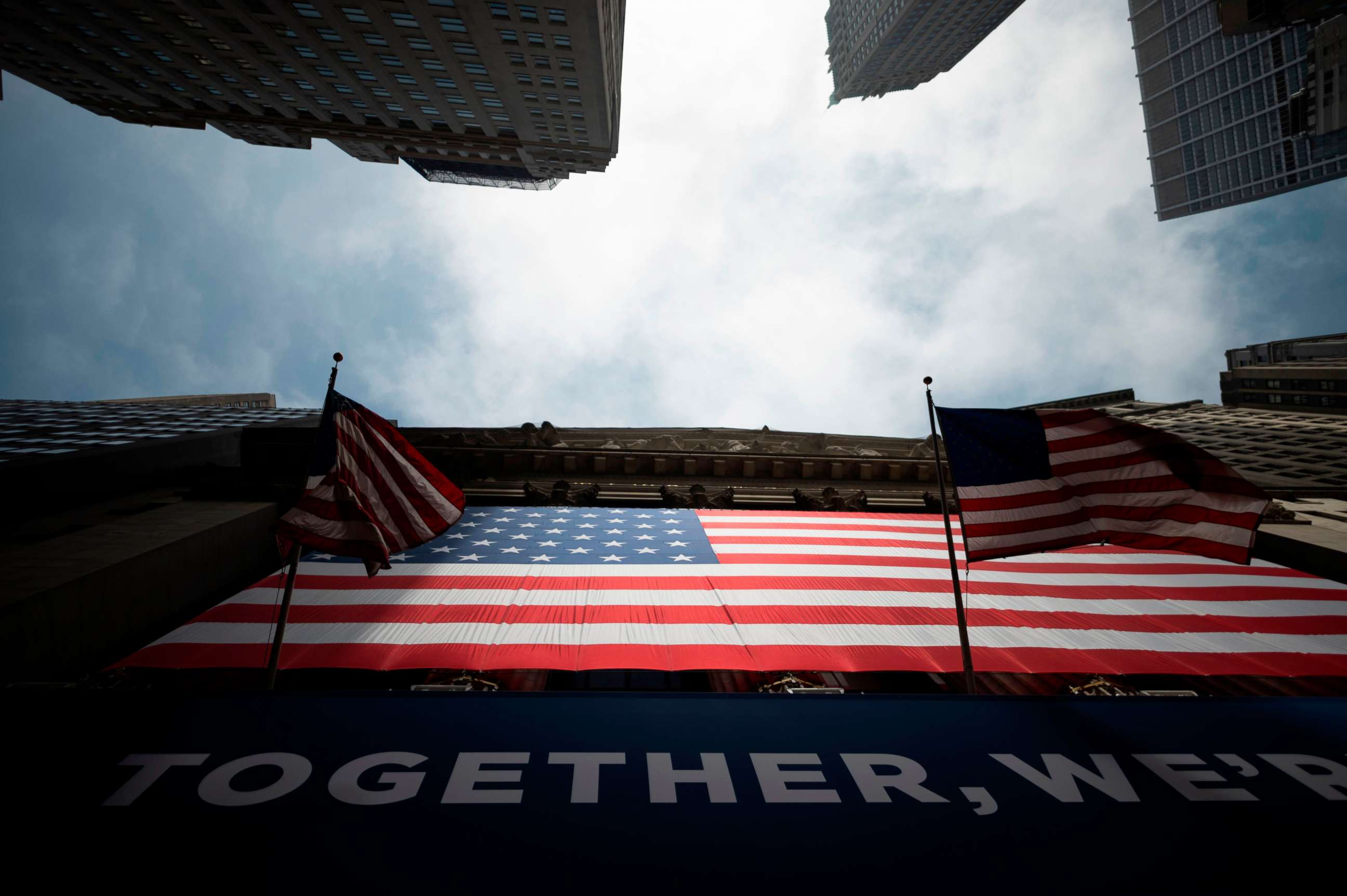
Abu Toha M.R. Bhuiyan, chief health coordinator of Bangladesh's Office of the Refugee, Relief and Repatriation Commissioner, told the Associated Press that the victim was a 71-year-old refugee who died on Sunday in an isolation center set up by the government and aid agencies where he had been admitted with COVID-19 symptoms a week earlier. Samples collected from him tested positive for the virus on Monday.
The first known COVID-19 cases in the camps were confirmed last month. One was a Rohingya refugee and the other was a Bangladeshi citizen.
Bangladesh currently has more than 52,000 diagnosed cases of the disease with at least 746 deaths, according to a count kept by Johns Hopkins University.
3:45 a.m.: US should have 100 million vaccine doses by end of year, Fauci says
The United States should have 100 million doses of one potential vaccine for COVID-19 by the end of the year, according to Dr. Anthony Fauci, the nation's top medical expert on the coronavirus pandemic.
"We're going to start manufacturing doses of the vaccines way before we even know that the vaccine works, so that by the end of the year the prediction of the statistical analysis and the projection of cases indicate that we may know whether its effective, efficacious or not by maybe November, December, which means that by that time we hopefully would have close to a 100 million doses," Fauci, the director of the National Institute of Allergy and Infectious Diseases and a key member of the White House coronavirus task force, said Tuesday during a live video interview with the Journal of the American Medical Association.
"And by the beginning of 2021, we hope to have a couple of hundred million doses," he added. "So it isn't as if we're going to make the vaccine show its effective and then have to wait a year to rev up to millions and millions of doses. That's going to be done as we're testing the vaccine."
A number of clinical trials for COVID-19 vaccine candidates are well underway around the world.
The third and final phase of trials testing an experimental vaccine developed by Massachusetts-based biotech firm Moderna will begin in July. A few other vaccine candidates, including one developed by U.K.-based pharmaceutical company AstraZeneca, are also showing promise, according to Fauci.
ABC News' Courtney Condron, Ben Gittleson, Alina Lobzina, Jordyn Phelps, Ben Siegel, Michelle Stoddart and Christine Theodorou contributed to this report.
